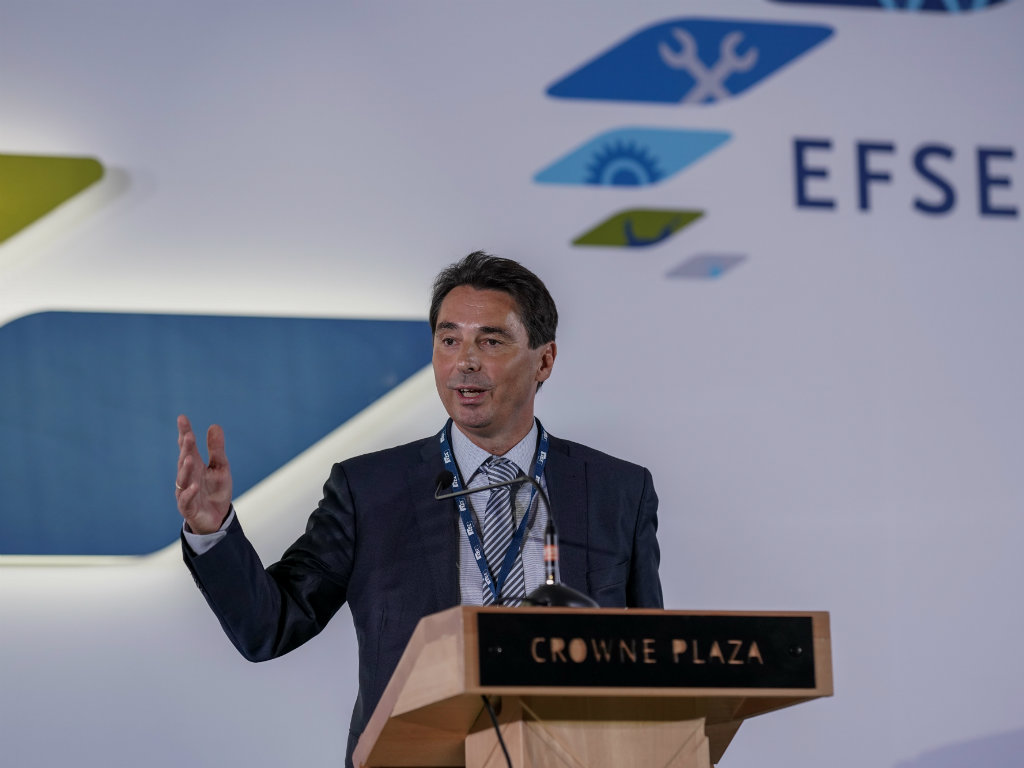Christoph Tiskens, EFSE Board chairman – Small economy needs long-term investment credits
Source: eKapija
 Monday, 28.10.2019.
Monday, 28.10.2019.
 15:45
15:45
 Monday, 28.10.2019.
Monday, 28.10.2019.
 15:45
15:45
(Photo: EFSE)

The EFSE operates under the principle of a public-private partnership between development finance institutions, donors and private investors and aims to support economic development and prosperity in Southeast Europe through investments in micro and small enterprises and improving the living conditions in households by supporting local finance institutions.
Tiskens, who has acquired a rich experience in developing successful practices for investing in small economy in his various management positions at the German Development Bank KfW (the founder of the EFSE), points out that Serbia is one of the main countries in the Fund's portfolio.
He says that effort needs to be made to strengthen the sector of micro and small enterprises in Serbia in order to reach the EU level of employment and the small economy's GDP share, adding that increased access to finance, necessary for small business to grow, is one of the requirements for this.
eKapija: What is the advantage of micro-loan funds, but also of donor-investor public-private partnerships in the micro-loan segment?
– The European Fund for Southeast Europe, or EFSE, is often referred to as “The Entrepreneurship Fund” because of our mission to promote business growth by supporting a conducive infrastructure for micro and small enterprises (MSEs)in Southeast Europe and the Eastern Neighbourhood Region. We do this by investing in the ability of local financial institutions to meet the needs of the MSE sector. That means we provide market-rate loans to these institutions so they can on-lend much-needed funding to MSEs and private households, and we provide nonfinancial support in the form of technical assistance to expand their capacity to serve this segment. We choose our partners carefully, ensuring that they follow good governance and responsible finance practices. One aspect of responsible, sustainable financing includes enabling access to financing in local currency: This allows borrowers to invest in their business or home without worrying about exchange rate fluctuations.
EFSE is uniquely positioned to facilitate local currency lending, thanks to our multiple instruments for hedging against foreign exchange risk – one of which is a special layer in our fund structure enabled by contributions from the EU and the German Federal Ministry for Cooperation and Development. In fact, this is one example of the strong advantage provided by EFSE’s public-private partnership model. When EFSE was founded in 2005, it was a pioneer in leveraging public capital – from development finance institutions such as KfW, the German development bank and initiator of the fund, as well as donors like the EU – as a risk cushion to entice private investment. By combining public and private money into one purpose-driven fund, EFSE has been able to channel more investment, and thus create more impact, than any one of these institutions or sectors would have on their own.
eKapija: How important is financial support to micro and small enterprises, which are the drivers of economic development in each country?
– You are quite right, they are indeed the engine of economic growth and employment in EFSE’s target regions. And yet MSEs have particular financing needs and challenges compared to larger businesses. For one thing, micro and small enterprises often do not have the same level of collateral that bigger enterprises can offer to banks, and so financial institutions can require some guidance in how to create financial products that are affordable and size-appropriate for these borrowers. EFSE’s Development Facility specializes in supporting financial institutions in honing their practices for MSE finance. For another thing, access to finance can be challenging in rural areas. This is where our focus on financial technology comes in: “fintech”, such as online and mobile banking, credit scoring, and so on, can help expand financial inclusion to underserved groups.
eKapija: What would be the best ways of financing the small business sector?
– We have found that providing long-term loans to support investment cycles is the best way to support MSE development. That is why EFSE seeks to make long-term investment loans available to MSEs seeking to grow their business by expanding the capacity of the local financial sector to serve this segment. In this way, EFSE bolsters job creation and contributes to economic development in the countries in which it operates.
eKapija: How do you evaluate the micro and small business sector in Serbia?
– Micro and small enterprises are an integral part of the Serbian economy, contributing to nearly 40% of jobs and over 25% of the country’s GDP. There are a lot of hardworking entrepreneurs in the country! Yet for the European Union, these figures are 50% and 40%, respectively. That means efforts need to be made to strengthen Serbia’s MSEs to reach these levels, such as by increasing their accessing to the financing necessary for growth.
(Photo: EFSE)

eKapija: Small businesses in Serbia find it difficult to get funding. What is the reason for that and, more importantly, how can this change?
– Banks are reluctant to finance small businesses not only in Serbia but in general. Only a few banks support this sector, especially in the aftermath of the financial crisis. This is mainly because small businesses were the first to feel the negative effects of the financial crisis. However, sustained macroeconomic stability, improvement in the overall business environment, rising profitability and the EU accession process will work in favor of private investments in the coming years, especially in the small businesses sector.
eKapija: What are the advantages of lending with EFSE over other sources of lending?
– Many! EFSE has a proven track record of long-term collaboration with our partners. I should point out, by the way, that EFSE does not lend directly to individual businesses or borrowers, but rather to local financial institutions who serve MSEs and low-income households. We believe that investing in the ability of a country’s own financial sector to serve local small businesses is the key to long-term, impactful development. This approach also leverages the local partners’ on-the-ground network and market expertise.
When we invest in a financial institution, we work very closely with that partner to identify their needs and growth strategy and discuss how we can help them fulfil both. We evaluate the market together, make recommendations, and develop a custom-made technical assistance package to accelerate the success of the collaboration. We currently have 69 trusted partnerships across 16 countries that include commercial banks, leasing companies, and microfinance institutions. Our investees return to us time and again to renew the partnership – some have been part of the EFSE family for over a decade.
eKapija: Are there any special conditions, in general?
– Yes. The financial institution taking a loan from EFSE must be committed to enabling long-term investment finance to MSEs and/or low-income households. This often also includes conducting technical assistance for the benefit of end borrowers. In addition, our investees must demonstrate good governance and responsible finance practices.
eKapija: What is the response of financial institutions in Serbia when it comes to partnering with the fund?
– In addition to long-term funding, EFSE also supports its investees in capacity building through the EFSE Development Facility. So far, EFSE has invested EUR 1.0 million in over 37 projects for this purpose in Serbia. Examples of this type of support include a wide range of activities from developing scoring models and mobile applications to enabling efficient underwriting for MSE clients. We have also conducted banking sector projects, where we promoted agricultural value chain finance or have organized workshops on Basel III asset and liability management, and many others.
eKapija: What is the interest for the fund's loans in Serbia? Which companies are most likely to apply and are there many start-up companies that you support?
– We have seen increased demand for loans in general in Serbia in last two years. Serbia has transformed into a low-inflation, stable, growing economy, with fiscal surplus, declining public debt, significantly reduced external imbalances, and labor market recovery. Coupled with these positive developments, the banking sector recorded strong growth in 2019 of over 10%.
EFSE is meeting this increased demand for investment by providing dedicated funding to financial institutions that fulfil our criteria for responsible finance, good governance, and dedication to on-lending to entrepreneurs and low-income households. The EFSE Development Facility then not only helps these partners fill technical gaps in their capacity to serve this target group; the Facility also works together with local entrepreneurship organizations, such as SmartKolektiv, to support MSEs – including startups – with skills development, networking, access to funding opportunities, and more.
eKapija: What are the next EFSE activities and future plans considering Serbia?
– Serbia is one of the core countries in EFSE’s portfolio. The fund will continue to expand its presence in the country by offering local currency finance and working with partner financial institutions to support entrepreneurs through such support measures as, for example, acceleration programs.
eKapija: What would be your financial advice to micro and small businesses?
– I would encourage them to invest in their businesses, especially through innovative products and services that enable greater market outreach or entrance in the new markets. As the adage goes: Think globally and act locally!
Branislava Petrovic
Tags:
European Fund for Southeast Europe
EFSE
German Development Bank
KfW
Federal Ministry for Economic Cooperation and Development of Germany
Southeast Europe
Eastern Neighbourhood Region
financing micro and small enterprises
small economy
small business
microloans
public private partnership
entrepreneurship
sources of finance
Comments
Your comment
Most Important News
Full information is available only to commercial users-subscribers and it is necessary to log in.
Follow the news, tenders, grants, legal regulations and reports on our portal.
Registracija na eKapiji vam omogućava pristup potpunim informacijama i dnevnom biltenu
Naš dnevni ekonomski bilten će stizati na vašu mejl adresu krajem svakog radnog dana. Bilteni su personalizovani prema interesovanjima svakog korisnika zasebno,
uz konsultacije sa našim ekspertima.


 Izdanje Srbija
Izdanje Srbija Serbische Ausgabe
Serbische Ausgabe Izdanje BiH
Izdanje BiH Izdanje Crna Gora
Izdanje Crna Gora


 News
News








